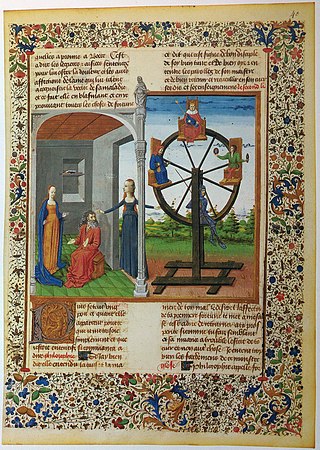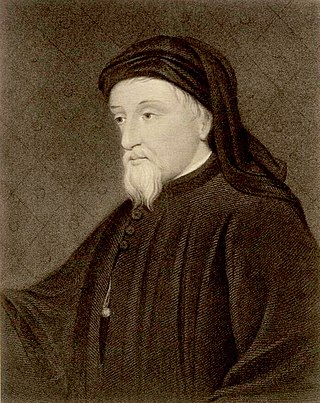
On the Consolation of Philosophy, often titled as The Consolation of Philosophy or simply the Consolation, is a philosophical work by the Roman philosopher Boethius. Written in 523 while he was imprisoned by the Ostrogothic King Theodoric, it is often described as the last great Western work of the Classical Period. Boethius' Consolation heavily influenced the philosophy of late antiquity, as well as Medieval and early Renaissance Christianity.

The Canterbury Tales is a collection of twenty-four stories that runs to over 17,000 lines written in Middle English by Geoffrey Chaucer between 1387 and 1400. It is widely regarded as Chaucer's magnum opus. The tales are presented as part of a story-telling contest by a group of pilgrims as they travel together from London to Canterbury to visit the shrine of Saint Thomas Becket at Canterbury Cathedral. The prize for this contest is a free meal at the Tabard Inn at Southwark on their return.

Geoffrey Chaucer was an English poet, author, and civil servant best known for The Canterbury Tales. He has been called the "father of English literature", or, alternatively, the "father of English poetry". He was the first writer to be buried in what has since come to be called Poets' Corner, in Westminster Abbey. Chaucer also gained fame as a philosopher and astronomer, composing the scientific A Treatise on the Astrolabe for his 10-year-old son Lewis. He maintained a career in the civil service as a bureaucrat, courtier, diplomat, and member of parliament.

Year 1394 (MCCCXCIV) was a common year starting on Thursday of the Julian calendar.

John Gower was an English poet, a contemporary of William Langland and the Pearl Poet, and a personal friend of Geoffrey Chaucer. He is remembered primarily for three major works, the Mirour de l'Omme, Vox Clamantis, and Confessio Amantis, three long poems written in French, Latin, and English respectively, which are united by common moral and political themes.
According to the medieval poet Jean Bodel, the Matter of Rome is the literary cycle of Greek and Roman mythology, together with episodes from the history of classical antiquity, focusing on military heroes like Alexander the Great and Julius Caesar. Bodel’s division of literary cycles also included the Matter of France and the Matter of Britain. The Matter of Rome includes the Matter of Troy, consisting of romances and other texts based on the Trojan War and its legacy, including the adventures of Aeneas.

Troilus and Criseyde is an epic poem by Geoffrey Chaucer which re-tells in Middle English the tragic story of the lovers Troilus and Criseyde set against a backdrop of war during the siege of Troy. It was written in rime royale and probably completed during the mid-1380s. Many Chaucer scholars regard it as the poet's finest work. As a finished long poem it is more self-contained than the better known but ultimately unfinished The Canterbury Tales. This poem is often considered the source of the phrase: "all good things must come to an end" (3.615).
Ziri ibn Manad or Ziri son of Mennad was the founder of the Zirid dynasty in the Maghreb.
Handlyng Synne by Robert Manning of Brunne is a Middle English verse devotional work, intended for the use of both learned and unlearned men, dealing with the theory and practice of morality, and illustrating this doctrine with stories drawn from ordinary life. It was begun in the year 1303. It is valued today for its simple and entertaining style, and for the light it throws on English life in the Middle Ages.
Anthroponymy is the study of anthroponyms, the proper names of human beings, both individual and collective. Anthroponymy is a branch of onomastics.
Chaucer's influence on 15th-century Scottish literature began towards the beginning of the century with King James I of Scotland. This first phase of Scottish "Chaucerianism" was followed by a second phase, comprising the works of Robert Henryson, William Dunbar, and Gavin Douglas. At this point, England has recognised Scotland as an independent state following the end of the Wars of Scottish Independence in 1357. Because of Scottish history and the English’s recent involvement in that history, all of these writers are familiar with the works of Geoffrey Chaucer.

Contact between Geoffrey Chaucer and the Italian humanists Petrarch or Boccaccio has been proposed by scholars for centuries. More recent scholarship tends to discount these earlier speculations because of lack of evidence. As Leonard Koff remarks, the story of their meeting is "a 'tydying' worthy of Chaucer himself".
Robert Fossier was a French Historian, specializing in the Western Middle Ages.

Troy Book is a Middle English poem by John Lydgate relating the history of Troy from its foundation through to the end of the Trojan War. It is in five books, comprising 30,117 lines in ten-syllable couplets. The poem's major source is Guido delle Colonne's Historia destructionis Troiae.
The rash promise is a common motif in medieval and folk literature, especially fairy tales. It was also termed a blind promise or rash boon. It is classified in the Motif-Index of Folk-Literature as motif M223 and likely has an Oriental origin.
Carolyn Dinshaw is an American academic and author, who has specialised in issues of gender and sexuality in the medieval context.
The New Chaucer Society is a professional academic organization dedicated to the study of Geoffrey Chaucer and the Middle Ages, founded in 1979. Its predecessor, the original Chaucer Society, had been founded by Frederick James Furnivall in 1868 and had closed in 1912. It is now based at the University of Miami in Coral Gables, FL.
Alastair J. Minnis is a Northern Irish literary critic and historian of ideas who has written extensively about medieval literature, and contributed substantially to the study of late-medieval theology and philosophy. Having gained a first-class B.A. degree at the Queen's University of Belfast, he matriculated at Keble College, Oxford as a visiting graduate student, where he completed work on his Belfast Ph.D., having been mentored by M.B. Parkes and Beryl Smalley. Following appointments at the Queen's University of Belfast and Bristol University, he was appointed Professor of Medieval Literature at the University of York; also Director of the Centre for Medieval Studies and later Head of English & Related Literature. From 2003 to 2006, he was a Humanities Distinguished Professor at Ohio State University, Columbus, from where he moved to Yale University. In 2008, he was named Douglas Tracy Smith Professor of English at Yale. He retired in 2018, and is now living in the Scottish Borders. Professor Minnis is a Fellow of the English Association, UK (2000), a Fellow of the Medieval Academy of America (2001), and an Honorary Member of the Royal Irish Academy (2016). From 2012 to 2014, he served as President of the New Chaucer Society. Currently, he is Vice-President of the John Gower Society. He was General Editor of the Cambridge University Press series Cambridge Studies in Medieval Literature from 1987 to 2018, and holds an honorary master's degree from Yale (2007) and an honorary doctorate from the University of York (2018). The University of York also bestowed on him the honorific title of Emeritus Professor of Medieval Literature (2018).
Norman Francis Blake was a British academic and scholar specialising in Middle English and Early Modern English language and literature on which he published abundantly during his career.
Christopher Cannon is a medievalist at Johns Hopkins University. He is currently Bloomberg Distinguished Professor of English and Classics, previously Chair of Classics, and from 2020, Vice Dean for the Humanities and Social Sciences in the Krieger School of Arts and Sciences. His research and writings have focused on the works of Geoffrey Chaucer, early Middle English, and elementary learning in the Middle Ages.








